U.S. Defense Secretary Mark Esper suggested that Europe, not Washington, should shoulder the responsibility for supporting France’s counter-terror mission in Africa’s Sahel region.
“France has reached out to other European allies, I think it’s time for other European allies to assist, and that could offset whatever changes we make as we consider next steps,” Esper said following a meeting with France’s Armed Forces Minister Florence Parly on Monday, January 27.
Esper’s comment comes as French officials appealed to the U.S. not to cut support for the mission.
“I had the opportunity to … mention again, that the U.S. support is critical to our operations and its reduction would severely limit our effectiveness against terrorists,” Parly said.
The “limited U.S. support” in the Sahel “leverages an immense effort carried out by France and Europe,” she said.
Roughly 4,700 troops are deployed to the France-led Operation Barkhane mission in the region, focusing their operations in insurgent-hit Mali, Niger and Burkina Faso.
The Pentagon is considering reducing its presence in Africa amid a review of its missions worldwide. The 2018 U.S. National Defense Strategy calls for a reorientation of American military attention towards Europe and the Indo-Pacific region to counter Russia and China’s military and economic ambitions.
Esper said earlier this month that he intends to prioritize “threats to the homeland.”

The U.S. maintains some 6,000 troops across Africa, where it supports Barkhane, as well as the African Union’s Mission in Somalia (AMISOM), which targets the al-Qaeda-linked al-Shabaab network.
U.S. forces based in Niger provide intelligence, surveillance and reconnaissance to their partners in the Sahel, as well as crucial air-to-air refueling.
Esper on Monday stressed that decisions on changes to the U.S. military footprint had not yet been made.
French troops deployed to Barkhane work alongside local forces and other international operations in the Sahel, including the G5 Sahel Joint Force (FCG5S), which comprises troops from Burkina Faso, Mali, Niger, Chad and Mauritania, and MINUSMA, the United Nations stabilization mission in Mali.
A variety of Islamist militant groups – including ISIS affiliates, al-Qaeda-linked groups like Jama’at Nasr al-Islam wal-Muslimin (JNIM) in the Sahel, as well as Boko Haram in Nigeria – are increasingly threatening the stability of west and central African states.
According to the U.N., around 4,000 people were killed in militant attacks in Burkina Faso, Mali and Niger last year. By November, more than one million people had been internally displaced across the five Sahel states – more than twice the number displaced in 2018.
Earlier on Monday, France’s Foreign Minister Jean-Yves Le Drian appealed to the U.S. not to withdraw its support for the effort.
“I hope they will be rational to keep this partnership … and that good sense will prevail,” Le Drian told reporters.

France builds Sahel Coalition
The Pentagon’s review comes at a critical time for France’s mission. Earlier this month, President Emmanuel Macron and the G5 Sahel leaders agreed to form a “Sahel Coalition” to focus counter-terror efforts in the Burkina Faso-Mali-Niger tri-border area, with a priority on targeting Islamic State. The leaders also agreed that French, international and FCG5S troops would operate under a joint command.
Burkina Faso, Chad, Mali, Mauritania, Niger, Togo and Senegal have also called on Washington not to end support for the mission. U.N. Secretary-General Antonio Guterres called for more international support for the G5 nations in July, and warned in November that the spiraling violence in the Sahel has spread to coastal states of West Africa.
Macron said earlier this month that European, African and international forces were invited to join the Sahel Coalition, and France’s most senior military officer said the Barkhane force will be further bolstered this year.

European countries already contribute to France-led operations in the Sahel. Both Denmark and the U.K. have deployed helicopter crews and Estonia’s parliament has approved plans to send 95 troops, nearly doubling its commitment.
France expects a new international special operations task force – dubbed “Takuba” – to deploy to Mali in 2020. More than a dozen countries have been invited to participate, but only Estonia has publicly said it will deploy troops to the mission. Belgium and the Czech Republic have also reportedly signaled that they will participate, but the U.S. and Germany have declined.
European states are the largest contributors to security and development projects in the Sahel. The E.U. has pledged more than €150 million for the FCG5S force and operates a training mission in Mali as well as security capacity building missions in the Niger and Mali. European nations – including Germany, the United Kingdom and Denmark – also contribute to the MINUSMA peacekeeping mission.
“U.S. support in the Sahel is really critical to our operations,” Parly said alongside Esper on Monday, adding that Washington’s support is “even more necessary” since Macron’s latest agreement with the G5 Sahel countries.
“We fully understand the process the United States is in,” she said. “Secretary Esper has a difficult job to handle, how to reorganize the American footprint, so we understand the constraints.”
“We’re trying to find the best position to accommodate the constraints,” Parly said.
The Trump administration has pushed NATO and European allies to assume bigger roles in international security-building and counterterrorism missions.
US gives Niger Air Force hangar for C-130 transport aircraft at Agadez base


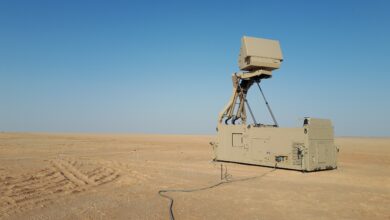

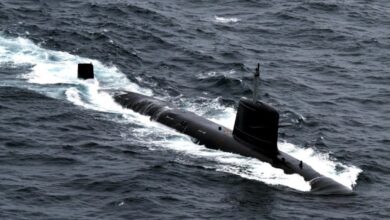
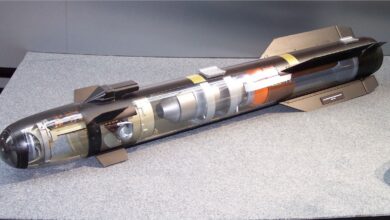

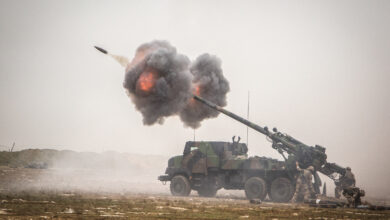
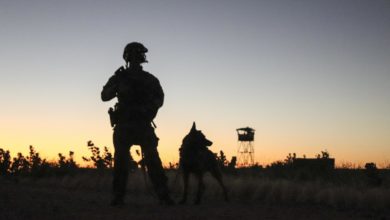

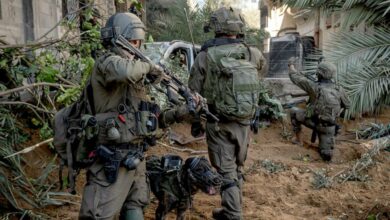
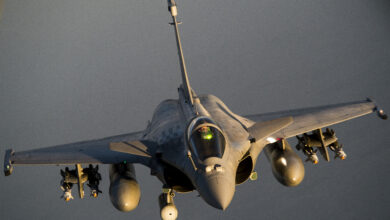
One Comment